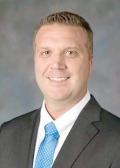At 6 a.m., after eight admissions back to back, I feel like I can’t stay awake any longer. I desperately need a nap. I have 30 minutes before my next admission, but I know I’m not going to rest. I close my eyes, and I only see charts. I’m trying not to collapse, but I still have three more patients to admit before I go home. And I can’t rest.
I’m scared that I’ll make a mistake. While I write my history of presenting illness, I imagine the day team reading my notes and hoping they don’t notice that I was about to crash on the desk. I check my documentation multiple times to make sure I don’t miss anything, and I know that won’t relieve my anxiety. When I leave, I will still feel the failure of not being able to give my best for my patient or for my night team, because I’m too tired. I know this frustration is going to give room to the emptiness – that indifference of being so beaten up that you can’t feel anymore.
And eventually, shame comes in. I’m ashamed of how I feel, because somehow, it means I am weak. All these feelings threaten to cripple me. Then I get home and cry till I fall asleep.
Recently, I read an article about a young physician contemplating suicide in her first year of practice. She described the dread of going into work and the emptiness left at the end of the day. Halfway through my second year of residency, I could relate to those feelings. I dealt with the anxiety of wondering what type of shift I was going to walk into, and experienced the stress of not wanting to disappoint the team, my peers, the patient, or myself.
Being constantly afraid of making a mistake is tiring. Sometimes, I get the pat on the back from senior physicians, saying I will survive. But it’s not enough. I can’t blame them. It’s human nature to forget how bad it hurt and just remember being strong enough to bear it. I count the days til I have a day off or the weeks til my next vacation. I try not to complain as much because nobody wants to hear it, and nothing is going to change. I feel deeply alone, like nobody cares.
And in the end I put myself onto this path. I knew what I was getting myself into. And I get myself out of it. I hold on to the smiles my staff give me when I walk in. I experience that 10-minute interview with someone whose thought process was so disorganized, and I realize that it took some skill to connect with that patient.
I am heartened by my ability to deescalate a patient who was about to become violent because I know Spanish. I notice that I am able to work faster than I did just a year ago. So I hold on. The trick was to find what made me want to hold on and what motivates me.
I’m not going to write about socializing or finding a hobby outside of medicine. But I must acknowledge that I have a wonderful book club, supportive boyfriend, and family. I lose myself in books, TV shows, cooking. I even started reading comic books. Plenty of articles are out there about how to beat physician burnout. They all help. I tried knitting, coloring, you name it, but for me, those activities were just not enough. I had to try to find meaning behind the work I do. I had to grab all those small moments during a shift and knit them together to build a bridge to where my passion lies. Then I started by reminding myself why I wanted to practice medicine and why psychiatry.
What inspires me is learning how to decipher what hides behind a symptom – why patient A’s anxiety is different from patient B’s. I find psychodynamics fascinating, so I read. I read literature, articles, and books with subjects around my interests. So when I see a patient at 4 a.m. for 5 minutes, I can knit it together with what I read. So it has meaning. And then it’s easier to hold on. Because the 12-hour overnight shift becomes hours of learning about my passion. Because I feel a step closer. And even though last night’s shift was so hard, I’m happy to be back at work today. When I read about the psychopathology of depression and then admit five patients with suicidal ideation, it stops being the same story over and over. It turns into an exploration, and it becomes fascinating. I won’t hear the same story again. So many times, attendings told me to read, and I had to be at my breaking point to understand why it was so essential. Now I’m motivated, and I plan to keep pushing myself to the limit to find a new challenge and to surprise myself in the middle of my beat-up tiredness when I see something in my patient that so many have written about. The adrenaline rush comes on the path of becoming that psychiatrist I aim to be, not in the diploma I will get 2 years from now.
I am racing against burnout, but I’m winning. And I wanted to share my experience to remind others that we are not alone on this path, and we should not have higher suicide rates than other professional groups.
If you are a resident or more experienced physician, know that you are not alone. Many others just like you are stretching themselves thin. Follow the tips of how to beat burnout that you’ve seen around. Find what works for you and dig into yourself, into what drove you in this direction, into where your passion lies. Find the meaning behind this hard work, and connect it to the passion that motivates you. Think of what made you want to become a doctor! I’m not sure it works 100% of the time.
Ask me again in 6 months.
Dr. Serrano is a PGY2 psychiatry resident at the Einstein Medical Center in Philadelphia.





